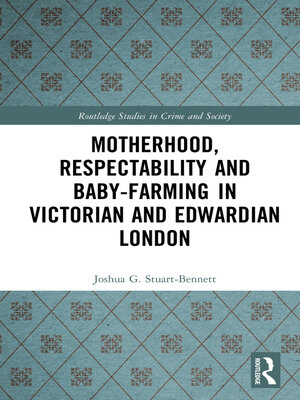Motherhood, Respectability and Baby-Farming in Victorian and Edwardian London
ebook ∣ Routledge Studies in Crime and Society
By Joshua Stuart-Bennett

Sign up to save your library
With an OverDrive account, you can save your favorite libraries for at-a-glance information about availability. Find out more about OverDrive accounts.
Find this title in Libby, the library reading app by OverDrive.



Search for a digital library with this title
Title found at these libraries:
| Library Name | Distance |
|---|---|
| Loading... |
Motherhood, Respectability and Baby-Farming in Victorian and Edwardian London explores a largely obscured marketplace of motherhood that provided ways for women to manage the stigma of illegitimacy and their respectable identities within Victorian and Edwardian society. It focuses on the extent of women's 'dirty work', when maternal problem management was fundamental to the general maintenance of respectability and, by extension, to Empire and Civilisation.
Despite its intrigue, history has struggled to understand and represent an uncomfortable but significant artefact of Western modernising society: 'baby-farming'. During a period when ideologies of respectability and civilisation arguably mattered most, the 'right' kind of parenthood – especially motherhood – became paramount. As the 'wrong' offspring could jeopardise a woman's chances of being respectable, a wholesale, informal, and somewhat clandestine marketplace emerged that catered to various maternal difficulties. Within this marketplace, a pregnancy or newborn child who may have compromised a woman's respectability could be 'disposed' of through different means, for a fee. From the Victorian period to the present, the commercialised maternal practices associated with baby-farming have become firmly established within collective consciousness as being synonymous with child murder, female pathology, and 'infanticide for hire'. This book provides a revised, far more complex, and nuanced narrative history which reveals all that was associated with baby-farming – including all possible outcomes – to be entirely natural, rational, and even necessary products of their time; an understandable outcome of the period's 'civilising offensive'.
Motherhood, Respectability and Baby-Farming in Victorian and Edwardian London will be of great interest to students and scholars of criminology, sociology, history, and gender studies.







